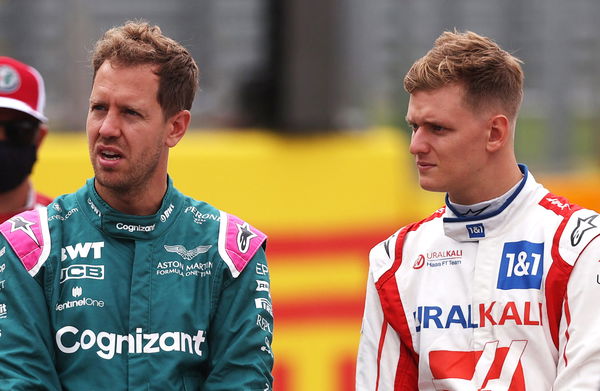
via Getty
NORTHAMPTON, ENGLAND – JULY 15: Sebastian Vettel of Germany and Aston Martin F1 Team and Mick Schumacher of Germany and Haas F1 look on as the prototype for the 2022 F1 season is unveiled during previews ahead of the F1 Grand Prix of Great Britain at Silverstone on July 15, 2021 in Northampton, England. (Photo by Lars Baron/Getty Images)

via Getty
NORTHAMPTON, ENGLAND – JULY 15: Sebastian Vettel of Germany and Aston Martin F1 Team and Mick Schumacher of Germany and Haas F1 look on as the prototype for the 2022 F1 season is unveiled during previews ahead of the F1 Grand Prix of Great Britain at Silverstone on July 15, 2021 in Northampton, England. (Photo by Lars Baron/Getty Images)
Germany has a rich history in F1 and continues to produce talented drivers, most recently Mick Schumacher, and successful teams. But the current state of the sport in the country is far from its former glory. Germany enjoyed a golden era in the sport, with Michael Schumacher winning seven World Championships, Sebastian Vettel winning four in a row, and Rosberg taking the most recent title in 2016.
Norbert Haug, the former vice president of Mercedes’ motorsport, has expressed his disappointment in the decline of Formula 1 in Germany. Haug has a long history with the sport, having played a key role in the partnership between Mercedes and McLaren in the mid-1990s and being involved in F1 during the height of Michael Schumacher’s success.

via Getty
MANAMA, BAHRAIN – APRIL 04: Motorsport / Formel 1: GP von Bahrain 2004, Manama; Michael SCHUMACHER (GER) / Ferrari, gewinnt den Grand Prix 04.04.04. (Photo by Alexander Hassenstein/Bongarts/Getty Images)
In an interview with Germany’s RND, Haug stated, “In Germany, Formula 1 has turned into a tragedy that every motorsport enthusiast can only be ashamed of.”
ADVERTISEMENT
Article continues below this ad
“For a dozen years, in the late 1990s and 2000s, there were two Formula 1 races a year in Germany, in front of full ranks and over 100,000 spectators. On RTL, 12 million people watched, instead of three million today.”
Haug then went on to bash the current German driver situation and puts it in contrast to the past glorious times of motorsport in his country.
F1 in Germany after Sebastian Vettel’s retirement
Germany now has only one driver on the grid, Nico Hulkenberg, and one on the sidelines, Mick Schumacher. And with no German constructor and no GP in the country, it is fair to assume a further decline in popularity is imminent.

via Reuters
Formula One F1 – Abu Dhabi Grand Prix – Yas Marina Circuit, Abu Dhabi, United Arab Emirates – November 20, 2022 Aston Martin’s Sebastian Vettel ahead of his last race REUTERS/Aleksandra Szmigiel
While Haug criticized the driver situation, he also targeted the manufacturers for staying away from the sport despite their country having a reputation for automobiles. He said, “A zealous green auto objector could not have developed a less ambitious and less successful German Formula 1 strategy.”
ADVERTISEMENT
Article continues below this ad
He went on to clarify that this criticism does not extend to the Mercedes works team, which he believes is operating right out of England, with two great English drivers.
WATCH THIS STORY: Sebastian Vettel Championship Seasons
ADVERTISEMENT
Article continues below this ad
What remains to be seen is how the sport sustains its current fan base in the country. Will it decline further or grow with the addition of Audi and the return of racing in the country? Time will only tell.
ADVERTISEMENT
ADVERTISEMENT
ADVERTISEMENT
ADVERTISEMENT

